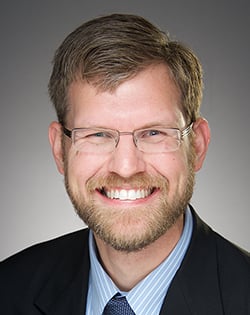Improving Sepsis Care in Rural America

Nicholas Mohr, MD, MS, became an emergency physician because he liked solving puzzles. “Diagnosis is the heart of medicine,” he said, “and the ED is where diagnosis is done at warp speed.”
As a former engineer and Iowa native, he loved studying the physiology and treatment of critical illness. After his fellowship in critical care medicine, Mohr returned to the University of Iowa to practice emergency medicine and critical care.
Dr. Mohr has been engaged in critical care research for the last 4 years. “I never saw myself as a health services researcher,” Mohr said. “What I began to realize, though, was that in rural America, developing evidence-based systems of care to provide care to the critically ill can save lives.”
Dr. Mohr was interested in how rural sepsis patients receive care, and that’s when he turned to EMF for help. He was awarded the EMF Fellowship grant in 2014.
“EMF has helped me take my research into a new area,” Dr. Mohr said. “The training and support the EMF grant gave me was critical not only to performing this study, but also to learning new methods and building the skill set to conduct more rural health services research in the future.”
Dr. Mohr’s team analyzed medical claims from patients with severe sepsis or septic shock who were treated in Iowa hospitals. They found that inter-hospital transfer is associated with significantly higher mortality, even when adjusting for hospital and patient-level factors.
“Iowa is the perfect place to study rural regionalization of care,” Mohr said. “I do this work because I have family and friends who live in rural America, and high-quality emergency care should be available to all Americans.”
Dr. Mohr has worked for the University of Iowa College of Medicine as Assistant Professor of Emergency Medicine and Anesthesia Critical Care since July 2011.
Originally published in SCOPE Winter 2016

